Heads of major energy companies and leading market experts took part in the Energy Panel at SPIEF
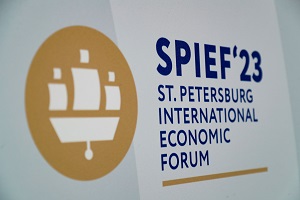
Heads of major energy companies and leading market experts took part in the energy panel "World Energy Transformation" under the XXVI St. Petersburg International Economic Forum.
The event, sponsored by Rosneft, featured speeches by Dai Houliang, Chairman of the Board of Directors of CNPC; Martin Vayvirovsky, Independent Expert; Rovshan Najaf, President of the State Oil Company of the Republic of Azerbaijan;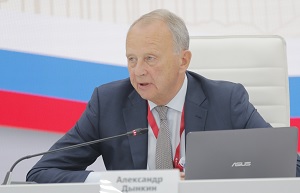 Leparan Gideon Ole Morintat, CEO of The National Corporation of Kenya; Vinod Kumar, Executive Director of Indian Oil Corporation Limited; and Nobuo Tanaka, Chairman of ICEF Supervisory Board and former IEA Executive Director. The session was moderated by Alexander Dynkin, Academician of the Russian Academy of Sciences and President of the Institute of World Economy and International Relations of the Russian Academy of Sciences.
Leparan Gideon Ole Morintat, CEO of The National Corporation of Kenya; Vinod Kumar, Executive Director of Indian Oil Corporation Limited; and Nobuo Tanaka, Chairman of ICEF Supervisory Board and former IEA Executive Director. The session was moderated by Alexander Dynkin, Academician of the Russian Academy of Sciences and President of the Institute of World Economy and International Relations of the Russian Academy of Sciences.
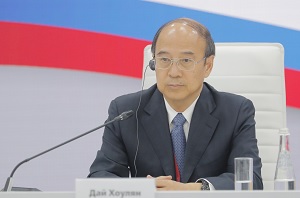 Dai Houliang, the Chairman of the Board of Directors of CNCP said during his speech that a meaningful energy transition must be realized. "We're not saying that we won't need traditional forms of energy in the future, just that there will be a change in the shares," he said.
Dai Houliang, the Chairman of the Board of Directors of CNCP said during his speech that a meaningful energy transition must be realized. "We're not saying that we won't need traditional forms of energy in the future, just that there will be a change in the shares," he said.
The head of CNPC said that the world was in a stage of profound change, which has not been seen in the last hundred years. "The international geopolitical situation is very complicated, it has an impact on international business, the production chains and supply of energy resources have been hit hard. And in such a difficult environment, we must do everything possible to help countries continue to cooperate with each other," he pointed out.
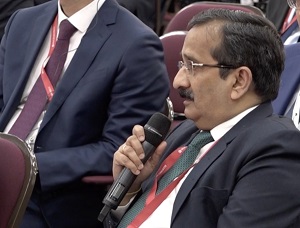 “In this regard, it is necessary to deepen energy cooperation between Russia and China in the field of oil and gas, as well as new energy sources,” Dai Houliang said. "We must create new platforms, a new situation for such cooperation around the world. We must play the role of those countries that will promote cooperation built on the principles of openness and fairness. Once again I would like to emphasize that this is how we can solve all problems," he concluded.
“In this regard, it is necessary to deepen energy cooperation between Russia and China in the field of oil and gas, as well as new energy sources,” Dai Houliang said. "We must create new platforms, a new situation for such cooperation around the world. We must play the role of those countries that will promote cooperation built on the principles of openness and fairness. Once again I would like to emphasize that this is how we can solve all problems," he concluded.
Vinod Kumar, Executive Director of Indian Oil, also addressed the issue of the need for cooperation to ensure energy security. According to him, Russia is a time-tested partner for India, and cooperation between the countries is actively developing. "The share of Russian crude oil imports, which was less than 2% last year, has increased tenfold to 20%. I expect this figure to reach 30% in the current fiscal year," he said.
"Thus, it is guaranteed that trade between the two countries will grow even stronger and Russia will be given a serious role in ensuring India's energy security," Vinod Kumar concluded.
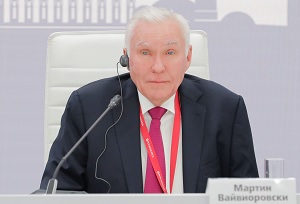 Adviser to "Advantage Energy" Martin Wiewiorowski, who has more than 40 years of experience in the oil and gas industry, including in Russia, called the changes taking place in the energy sector today incredibly significant. Among the main signs of these troubled times, Wiewiorowski singled out the lack of energy resources and the industry's significant underinvestment.
Adviser to "Advantage Energy" Martin Wiewiorowski, who has more than 40 years of experience in the oil and gas industry, including in Russia, called the changes taking place in the energy sector today incredibly significant. Among the main signs of these troubled times, Wiewiorowski singled out the lack of energy resources and the industry's significant underinvestment.
"Investments are constantly decreasing, as we note this trend at the global level, and the decline is about 5% annually. At the same time, the total CAPEX in the industry has fallen by almost 40% over the last ten years, not adjusted for inflation. We're also seeing a persistent lack of financing, which is driving up the cost of new projects," he said.
According to the expert, the Russian oil industry is doing relatively well compared to the rest of the world. "We see that the world's oil reserves are constantly decreasing - this is especially noticeable from the data for the last ten years. At the same time, we haven't heard about serious, big discoveries of fields for a long time. Unlike Russia, which was able to discover important fields for the world. This is certainly impressive. Siberia and offshore opportunities, the Russian Arctic and the Far East. The Arctic is very interesting in this respect, especially in the context of the development of the Northern Sea Route, which can certainly make the logistics for the Arctic fields extremely attractive," said Wiewiorowski.
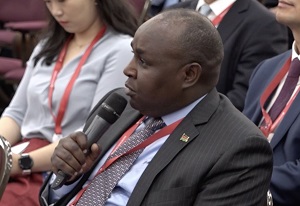 According to Leparan G. Ole Morintat, Africa is a very young and rapidly developing continent, which is why its countries need access to the energy sources.
According to Leparan G. Ole Morintat, Africa is a very young and rapidly developing continent, which is why its countries need access to the energy sources.
"Russia and Kenya have great prospects for cooperation in the field of the energy sector. "The competencies of Russian energy companies, especially such as Rosneft, in the field of geological exploration, production and construction of the relevant infrastructure can certainly help the National Oil Company of Kenya to more effectively monetize and develop the newly discovered fields in the country and effectively use our mandate to create an energy value chain. Undoubtedly, Russia can have an active presence in the Kenyan market, and more importantly, this may also involve the establishment of joint ventures," Ole Morintat said.
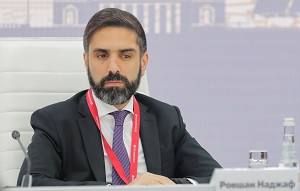 "The report of Igor Sechin that we heard clearly shows that oil and gas will be the main sources of energy for many decades to come," SOCAR head Rovshan Najaf said. - Therefore, we need to think about how to find ways not to reduce the use of fossil fuels, but to reduce emissions".
"The report of Igor Sechin that we heard clearly shows that oil and gas will be the main sources of energy for many decades to come," SOCAR head Rovshan Najaf said. - Therefore, we need to think about how to find ways not to reduce the use of fossil fuels, but to reduce emissions".
In his view, underinvestment in the oil and gas industry has been a problem throughout the past decade and remains one today. At the same time, financial institutions have been unwilling to finance exploration and production and have been less inclined to give loans. "We have to fight, we have to explain and clarify that there is a way to achieve this goal of reducing emissions through technology development.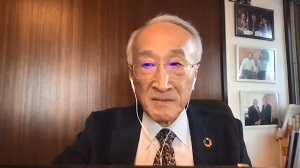 We need help, support and engagement from our partners," Najaf added.
We need help, support and engagement from our partners," Najaf added.
"Oil and gas operations now account for almost 15 percent of energy-related greenhouse gas emissions, and the industry has the capacity and resources to reduce them quickly and cost-effectively," said Nobuo Tanaka, former Executive Director of the International Energy Agency.
Rosneft
Information Division
June 17, 2023